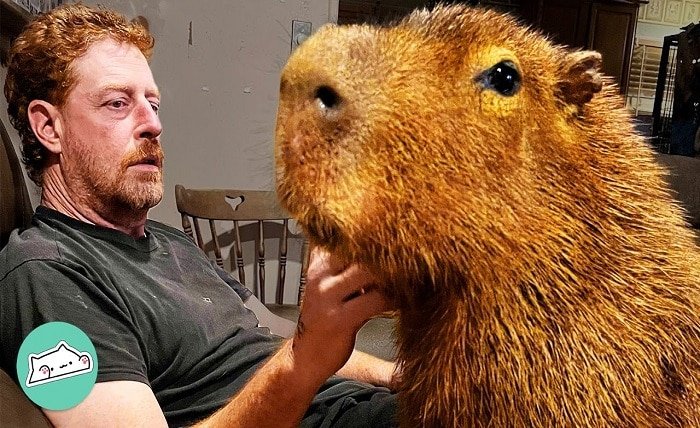Introduction
Capybaras are unique creatures that have gained popularity as exotic pets in recent years. Known for their gentle, social nature and large size, they are the largest rodents in the world. While these animals may seem like a fascinating choice for a pet, owning a capybara requires a deep understanding of their specific needs. In this blog post, we will discuss everything you need to know about keeping a capybara pet, from their behavior and habitat requirements to their diet and care needs. We’ll also explore some important considerations before you decide whether a capybara is the right pet for you.
What Is a Capybara Pet?
The capybara (Hydrochoerus hydrochaeris) is a semi-aquatic mammal native to South America, specifically found in countries like Brazil, Venezuela, and Colombia. Capybaras are herbivores and live in herds in the wild, typically near bodies of water like rivers, lakes, and wetlands. Due to their social nature, capybaras enjoy the company of other animals and humans alike, which makes them relatively easy to bond with if cared for properly.
In recent years, capybaras have grown in popularity as exotic pets, especially among people who love unique and low-maintenance animals. However, before considering a capybara pet, it’s essential to be aware of the unique care requirements these animals have. They are not your average house pet and need an environment that suits their semi-aquatic lifestyle.
Capybara Pet: Is It the Right Animal for You?
While the idea of owning a capybara pet may seem appealing to some, it’s important to consider whether you can meet the needs of this unique rodent. Capybaras require a large space, a proper diet, and access to water to thrive. They also require a high level of social interaction and attention, making them an ideal choice for someone who is at home often and can devote time to their care.
Space Requirements
Capybaras are large animals that can weigh up to 150 pounds or more. Because of their size, they require ample space to move around comfortably. Ideally, a capybara pet should have access to an outdoor enclosure that includes both land and water. A large backyard with a pond or small pool would be perfect for them. If you’re considering a capybara, ensure that you have a suitable living space.
Social Nature
Capybaras are highly social creatures that prefer living in groups. If you plan to keep a single capybara as a pet, you must be prepared to provide it with regular companionship, either from humans or other pets. Without enough socialization, capybaras can become lonely, stressed, and even depressed. If possible, it’s advisable to have at least two capybaras to ensure they feel secure and happy.
Capybara Pet Behavior and Temperament
Capybaras are generally known for their docile and calm temperament, making them great pets for families and individuals alike. However, like any pet, their behavior can be influenced by how they are raised and the environment in which they live. Understanding the behavior of a capybara pet is crucial to ensuring its well-being.
Friendly and Affectionate
Capybaras are often described as affectionate and friendly. They enjoy socializing with humans and other animals, which is why they are sometimes referred to as the “gentle giants” of the rodent world. They are often calm and easygoing, making them relatively low-maintenance companions.
Active During the Day
Capybaras are diurnal animals, meaning they are most active during the day. They enjoy grazing on grass, swimming, and interacting with others during the daylight hours. It’s essential to provide them with enough activity and mental stimulation to prevent boredom.
Communicative Animals
Capybaras are highly vocal animals that communicate with each other and their environment through a range of sounds. They may make grunting noises, purrs, and even high-pitched squeaks when excited or stressed. Understanding your capybara’s communication style is key to responding to their needs effectively.
What Does a Capybara Pet Eat?
As herbivores, capybaras primarily eat grasses, fruits, and vegetables. Their diet should be carefully balanced to ensure they are getting the proper nutrition. Here’s a breakdown of what a capybara pet typically eats:
Fresh Grass
Grass is the primary food source for capybaras. If you have access to fresh, pesticide-free grass in your yard, that’s the best option for feeding your capybara. However, if you don’t have access to grass, you can offer high-quality hay as a substitute.
Vegetables and Fruits
In addition to grass, capybaras enjoy eating fresh vegetables and fruits. Some suitable vegetables include leafy greens like spinach, kale, and dandelion greens. Capybaras also enjoy carrots, sweet potatoes, and squash. As for fruits, capybaras like watermelon, apples, and bananas, but these should be given in moderation due to their high sugar content.
Fresh Water
Since capybaras are semi-aquatic, they need constant access to fresh, clean water. It’s crucial to provide them with a water source they can submerge themselves in, such as a small pool, pond, or a large tub, especially if you don’t have a natural water source in your yard.
Supplements
Although a well-balanced diet of grass, vegetables, and fruits is usually sufficient for capybaras, some owners opt to give their pets specially formulated supplements for rodents. These can help ensure your capybara receives the right amount of vitamins and minerals. However, you should always consult with a veterinarian before introducing supplements into their diet.
Capybara Pet Care: Habitat and Living Space
Creating the perfect habitat for a capybara pet is essential for its health and happiness. These animals are semi-aquatic, so they require a habitat that includes both dry and wet areas. Here’s a guide to building a suitable living space for your capybara pet.
Outdoor Enclosure
The ideal habitat for a capybara pet is an outdoor enclosure that allows for plenty of space to roam. The enclosure should be large enough for them to explore, graze, and interact with their environment. Fencing should be tall and sturdy since capybaras can be excellent climbers. If you don’t have access to a large outdoor space, you may need to build a large pen or consider an indoor setup with adequate space and water features.
Water Access
Since capybaras are semi-aquatic, they need access to water to swim and bathe in. You can provide this by setting up a small pond, a kiddie pool, or a specially designed pool for capybaras. Make sure the water is clean and changed regularly to avoid health issues.
Sheltered Area
In addition to open space and water, your capybara pet will need a sheltered area to rest and protect itself from the elements. You can provide a simple wooden shelter or a small, enclosed area with bedding for warmth. A cozy, dry spot where your capybara can retreat will help it feel safe and secure.
Health and Veterinary Care for a Capybara Pet
Just like any pet, capybaras require regular health care to stay happy and healthy. Routine veterinary visits are necessary to ensure that your capybara is in good health and free from disease. Here are some essential health considerations for capybara pets:
Regular Veterinary Check-ups
Finding a vet who is experienced with exotic animals, particularly capybaras, is crucial. Regular check-ups will help monitor their health, including their weight, teeth, and overall condition. A vet can also provide guidance on diet, vaccinations, and preventive care.
Dental Care
Capybaras have continuously growing teeth, and it’s essential to monitor their dental health. Providing chewing materials, such as branches or chew toys, will help wear down their teeth naturally. If their teeth become overgrown, it can lead to pain and difficulty eating, so regular dental check-ups are important.
Parasite Prevention
Like all animals, capybaras are susceptible to parasites like fleas, ticks, and worms. Ensuring that your capybara is regularly treated for parasites and kept in a clean living environment will help prevent health issues. Additionally, a clean water source is vital to avoid waterborne parasites.
Legal Considerations and Ethical Issues
Before bringing a capybara pet into your home, it’s essential to check the legal regulations in your area. In many places, capybaras are considered exotic animals and may require special permits or licenses. Always ensure that owning a capybara is legal in your location before proceeding.
Ethical Considerations
Ethically, it’s important to consider the welfare of the animal. Capybaras are social creatures that thrive in groups, and it can be difficult for them to live solitary lives in captivity. If you choose to have a capybara as a pet, it’s essential to be prepared for the responsibility of keeping them happy and healthy, both physically and socially.
Conclusion
Owning a capybara pet can be an incredibly rewarding experience, but it’s not for everyone. These social, semi-aquatic creatures require a significant amount of space, time, and care to thrive. Understanding the unique needs of a capybara, from its diet to its habitat, is essential for ensuring its well-being. If you can meet these requirements and are prepared for the responsibility, a capybara can make a delightful, affectionate companion.
Before making the decision to adopt a capybara, take time to research and consider whether you can provide for its long-term care. With the right environment, socialization, and attention, your capybara pet can enjoy a happy and healthy life by your side.
FAQs
- Are capybaras good pets for families?
Yes, capybaras are generally friendly and social animals that can make great pets for families, especially if there is enough space and attention to care for them. - How much space do capybaras need?
Capybaras require a large outdoor space with both land and water areas. An ideal setup includes a fenced yard with access to a pond, pool, or water feature. - Can capybaras live alone?
While they can live alone, capybaras are highly social animals and prefer to live in groups. If you only have one, you should provide it with ample human interaction. - What do capybaras eat?
Capybaras primarily eat grass, vegetables, and fruits. They also need constant access to fresh water for drinking and swimming. - Do capybaras need regular veterinary care?
Yes, capybaras require regular veterinary check-ups to ensure their health, particularly for monitoring their teeth, weight, and overall condition.






